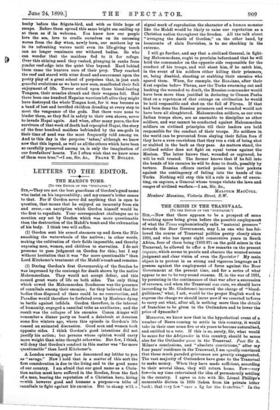LETTERS TO THE EDITOR.
THE MARDI'S TOMB.
[TO THE EDITOR OF THE "SPECTATOR."]
Srn,—They are not the best guardians of Gordon's good name who insist on his impeccability; and my censor's letter comes to that. For if Gordon never did anything that is open to question, that means that he enjoyed an immunity from sin and error,—an ascription which Gordon himself would be the first to repudiate. Your correspondent challenges me to mention any act by Gordon which was more questionable than the destruction of the Mandi's tomb and the exhumation of his body. I think two will suffice.
(1) Gordon sent his armed steamers up and down the Nile smashing the waterwheels of the natives ; in other words, making the cultivation of their fields impossible, and thereby exposing men, women, and children to starvation. I do not presume to pass judgment on Gordon for this; but I say without hesitation that it was "far more questionable" than Lord Kitchener's treatment of the Mandi's tomb and remains.
(2) During Gordon's first Governorship of the Soudan he was impressed by the contempt for death shown by the native Mahommedans. They would not accept defeat, and this caused great waste of life on both sides. The only thing which cowed the Mahommedan Soudanese was the presence of cannibals among their enemies ; for they believed that for bodies thus disposed of there could be no resurrection, and Paradise would therefore be forfeited even by Moslems dying in battle against infidels. Gordon therefore, in the interest of humanity, engaged a cannibal tribe as auxiliaries; and the result was the collapse of his enemies. Canon Ainger will remember a dinner party on board a dahabeah at Assonan some five winters ago, where this episode in Gordon's life caused an animated discussion. Good men and women took opposite sides. I think Gordon's good intentions did not justify his action; but persons whose opinion would carry more weight than mine thought otherwise. But few, I think, will deny that Gordon's conduct in this matter was " far more questionable" than Lord Kitchener's.
A London evening paper has denounced my lettter to you as " savage." Now I hold that in a matter of this sort the first consideration is due to the living and to the good name of our country. I am afraid that our good name as a Chris- tian nation must have suffered in the Soudan, from the fact of_a man, bearing the reputation of a Christian hero, hiring —with however good and humane a purpose—a tribe of cannibals to fight against his enemies. But to stamp with a signal mark of reprobation the character of a human monster like the Mandi would be likely to raise our reputation as a Christian nation throughout the Soudan. All the talk about " avenging the death of Gordon," on the other hand, by hecatombs of slain Dervishes, is to me shocking in the extreme.
I will go further, and say that a civilised General, in fight- ing Mahommedans, ought to proclaim beforehand that he will hold the commander on the opposite side responsible for the conduct of his troops, and will shoot him, if he catch him, in the event of his soldiers either killing their prisoners, or, being disabled, shooting or stabbing their enemies who spared them. When, for example, the Russians, after their fi rat repulse befora Plevna, saw the Turks swarming out and hacking the wounded to death, the Russian commander would have been more than justified in declaring to Osman Pasha that on a repetition of that outrage on civilisation he would be held responsible and shot on the fall of Plevna. If that had been done the Russian prisoners and wounded would not have been all slaughtered. Mahommedan soldiers, as our own Indian troops show, are as amenable to discipline as other soldiers, and war cannot be conducted against Mahommedan soldiers on civilised principles till their leaders are held responsible for the conduct of their troops. No soldiers in the world can be prevented from slaying their fallen foes if they have a sure conviction that they run a risk of being shot or stabbed in the back as they pass. As matters stand, the civilised soldier does not fight on equal terms against the Moslem. The latter knows that, wounded or captured, he will be well treated. The former knows that if he fall into the hands of his enemies he will be done to death, possibly by torture. Russian officers carried poison in their pockets against the contingency of falling into the hands of the Turks. Nothing will stop this till a rule is made of execu- ting, on capture, a General whose troops violate the laws and usages of civilised warfare.—I am, Sir, &c.,
MALCOLM MACCOLL.
Members' Mansions, Victoria Street, S.W.


















































 Previous page
Previous page